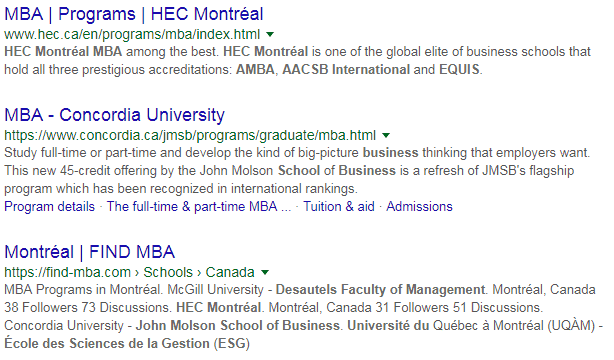Keywords are at the heart of digital marketing. What are keywords in education? Keywords help shape the content created for web pages and blogs, influence how professionals approach advertising, and effectively dictate the likelihood that your institution will be able to reach the audience it desires. By using the right SEO keywords for education, your school can better attract and engage its target audience.
But how do you know which keywords are worth targeting? Finding effective keywords is a perennial concern of digital marketing professionals everywhere and can confuse student recruitment professionals who are new to the area.
To make things easier, here’s a step-by-step guide to school keyword research.
1. Brainstorm Some SEO Keywords for Education Ideas
The best keywords should match search queries sent by users. This helps ensure your web content or advertising appears before a receptive audience.
The first step in choosing keywords for education marketing is a little unscientific, but it works. It involves just looking at your institution—its course offerings, location, the type of school it is, etc.—and then thinking about the kinds of search terms users might use to try and find it. For example, if your school offers an MBA program, “MBA school” would be an obvious keyword to consider targeting.
However, it’s important to note that broad keywords like this are hugely popular and, therefore, competitive. In the case of our above example, business schools and other organizations worldwide are likely also targeting the “MBA school” keyword. Only a select few will achieve a high ranking in search results, so using top SEO keywords may not be a good idea for smaller institutions to spend much time optimizing for that broad keyword.
Here Are Examples:
Example: The top three organic search results for the keyword “MBA school” are all third-party pages discussing top MBA programs for students to consider. Harvard is the school with the best ranking, seventh on the list. Smaller schools may have a very difficult time breaking into the top rankings.

Instead, the goal for most schools should be to target “long-tail keywords.” According to SemRush, long-tail keywords make up a large percentage of searches. This is a term for a more specific keyword. Doing so allows for two things: first, fewer searches will be made for that keyword, and second, there will almost certainly be fewer institutions competing to rank for that keyword.
You can create a long-tail keyword by combining important elements from your institution into a single keyword. For example, an MBA school in Montreal might incorporate its location into the long-tail keyword “MBA school in Montreal.” This keyword likely receives enough searches that it will be useful for your institution to rank for it. Still, it isn’t so outrageously competitive that it would be impossible to reach that point.
Example: The top three organic search results for the keyword “MBA school Montreal” are different from those pulled up from “MBA school.” For the schools represented in those results, optimizing for the long-tail keyword can help capture a smaller, though significant, search volume.

Ideally, you’ll want several long-tail keywords to target with your online content and advertising, but they don’t need to all be completely different. For example, “MBA school in Montreal,” “MBA program in Montreal,” and “MBA courses in Montreal” are all good, long-tail variations on a similar theme. Apart from location, some schools or programs can also benefit by creating education keywords for queries about beginning an eventual career—”become a photographer,” for instance.
2. Take Some Cues From Your Competition
Many schools likely operate in the face of competition, and learning and borrowing from this competition is important whenever possible. In search marketing, it is worth looking at keywords targeted by your competitors that your school could also target.
Select a few competitors you want to include in your analysis. Stick to just your 3-5 main rivals to start, but consider looking at more institutions over time as your resources allow. After selecting your schools, you will want to use SEO competitor analysis tools, which can help you get a read on the keywords that are most important to competitors’ organic and paid initiatives. Tools like SpyFu or SemRush are good starting options, as they offer some free utility before you are required to pay for unlimited access to the data you are after.
Using these tools is as simple as entering the competing website’s URL and then looking at the list of keywords the tool pulls up. If you see anything that applies to the school or program you are trying to get keywords for, note them down!
Example: A SpyFu search for a private career college in Ottawa, Canada, turned up these lists of the top keywords the school ranks for in organic and paid searches. Competing schools could use these lists to pick out good additional keywords to target.

Adding these keywords to the list of potential keywords you came up with in the first stage should provide you with a decent amount of ideas to bring forward into the next steps of the keyword research process. If you’re unsure how to proceed with this process, consider our SEO service offerings SEO for educational institutions.
3. Verify the Effectiveness of Keywords With Google Keyword Planner
Once you have compiled a list of potential SEO keywords for education, it’s time to do some testing to ensure they will be worth targeting. Mainly, you want to provide adequate search volume but not so much that you will have difficulty getting results from targeting those keywords.
You will also want to see which kinds of websites also rank for your chosen keywords, both for organic results and advertising, to gain a general idea of the keyword’s popularity.
If you see a couple of competitors ranking, odds are this is a keyword worth putting effort into. If you see many ads and competing websites in the results, it might be a sign that your keyword will be too competitive to target initially.
Noting these differences can even improve the SEO keyword strategy for colleges and other educational institutions.
A good tool to help you complete this process is Google Keyword Planner, which was made to help with keyword evaluation for Google AdWords advertising.
With a little extra effort, GKP can also be an excellent tool for selecting keywords for website content. Note that Keyword Planner is not meant to replace the manual steps outlined in the paragraph above but to assist in the keyword research process.
Here Are Examples
Example: A search in Google Keyword Planner for ‘ESL schools’ in the UK. The bar chart at the top of the page indicates the search volumes for the term in the last twelve months on mobile and desktop.

After inputting a keyword into GKP, you will be provided with a list of additional keyword ideas that are related to your input, an estimated range of the number of monthly searches for those keywords, and a primary readout of the level of competition present for that keyword—low, medium, or high.
Example: Searching for the keyword “Engineering school” in GKP provides a lengthy list of additional suggestions and estimations of their level of competition.

It is worth noting here again that this tool has a couple of shortcomings. First, the estimated level of competition is only directly applicable to AdWords advertising. You can expect this to provide a decent idea of their popularity in organic search optimization but understand that the information will be somewhat distant.
Second, and perhaps more importantly, the tool has a reputation among some search marketing experts for occasionally underestimating the volume of searches that keywords receive. Generally speaking, you can expect keywords to be a bit more popular than GKP tells you. Remember, this tool is meant to help, not to do all the heavy lifting of keyword research for you.
Finally, it’s good to consider the cost of keyword bids for advertising when choosing your keywords. Lower is better, of course, and if you can find a relevant keyword that offers similar reach at a lower price, that will be the one to go for.
The idea is to find higher education keywords with a significant search volume but low levels of competition, preferably ones that aren’t too costly to advertise. This should give you the best chance of gaining a good return on your marketing efforts.
4. Evaluate the Success of Your SEO Keywords for Education
As with most areas of digital marketing, developing advertising and SEO keywords for education is not meant to be a one-time activity. Rather, schools should continuously monitor their keyword performance and adjust the targeted keywords as time passes.
What are SEO keywords for education? SEO keywords determine the type of content you create for your website, and its performance on search engines depends on your approach. Prospective students often use specific keywords when researching schools online. By identifying and targeting these keywords, you can ensure your school’s website reaches the right audience.
Don’t forget, though, that success nearly always takes time. Realistically, most schools cannot expect amazing improvements in their search rankings until at least 4-6 months have passed, and ad results similarly take some time to achieve. Striking a balance between the patience necessary for allowing good keywords to net their results and identifying those that require replacement or elimination is important for this process.
Keyword-tracking tools like Moz and Google Search Console can be very useful. The latter ties into Google Analytics to offer insight into the queries that consistently drive users to your website. You can see this information generally and for each “landing page,” which is any page that users arrive at first on your website.
This allows you to drill down into which keywords are getting real results and could even provide you with new ideas for targeting keywords. Sometimes, your site might rank for something you hadn’t even thought of, and putting a little extra effort into creating content or advertising that addresses that query could help you get even better results.
Here Are Examples
Example: The search traffic screen in Search Console allows you to analyze the top queries driving traffic to your site by clicks, impressions, position, and click-through rate (CTR).

For advertising, you should be able to evaluate keyword performance through the advertising tool you are using. With Google AdWords, for instance, you can see the number of clicks you received from a given keyword, the overall click-through rate, and other important data indicative of a keyword’s performance.
Example: This screenshot shows the basic view of the Google AdWords keywords tab. Here, you can see the cost and performance of your keywords and specific campaigns and ad groups.

Understanding Keyword Research
Keyword research is a hugely important process for schools engaging in organic search optimization, important both in the initial stages of your campaigns and as a part of an ongoing process of continuous improvement. It can even be a way to improve your school’s online visibility, increasing traffic to your school website. In taking the time to brainstorm keyword ideas thoughtfully, conduct competitor analysis, and apply industry-standard tools to evaluate the suitability and effectiveness of keywords, schools of all sizes can develop a list of SEO keywords for education that offer the best basis for their ongoing digital marketing efforts.
FAQs To Consider
What are keywords in education?
Keywords help shape the content created for web pages and blogs, influence how professionals approach advertising, and effectively dictate the likelihood that your institution will be able to reach the audience it desires.
What are SEO keywords for education?
SEO keywords determine the type of content you create for your website, and its performance on search engines depends on your approach.







